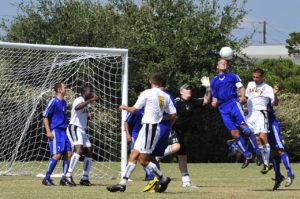
NEW YORK — A new study finds that performing a “header” while playing soccer — hitting the ball with your head— significantly increases the likelihood of getting a concussion.
Researchers at the Albert Einstein College of Medicine in New York published their findings in the journal Neurology. The study took its results from 222 adult, non-professional soccer players, 79% of whom were male.

Over a nine-month period, each participant regularly took part in online surveys, answering questions as to the number of headers they did, if they had experienced unintentional head impact during practice or a game, and whether they experienced symptoms like headache or confusion— potential telltale signs of head trauma.
It was found that players who head 125 or more balls over the course of two weeks— about nine a day— were three times as likely to have a concussion than those who did less than four headers over that period.
Despite convincing evidence that headers may be playing a significant role in player concussions, some have argued that player-to-player contact and collisions play a much bigger factor.
For example, a study in 2015 found that nearly 70% of concussions suffered by male high school soccer players came from such contact. (The same study acknowledged that the remaining 30% of concussions likely emanated from heading the ball.)
This phenomenon led researcher Dawn Comstock, an injury epidemiologist at the University of Colorado's School of Public Health, who was not related to the study, to argue what she believes is the key issue. “Before banning heading, the focus should be to enforce existing rules prohibiting athlete-to-athlete contact,” she told NPR. “That's the main risk for head injury in soccer.











1 Comment